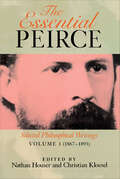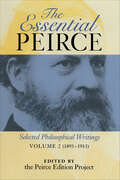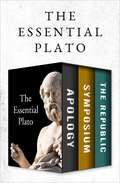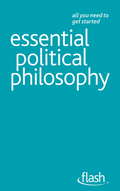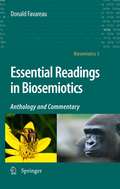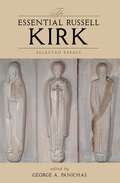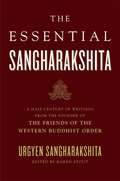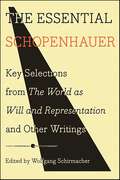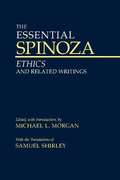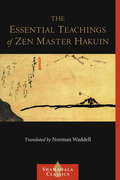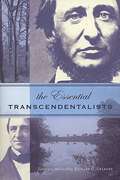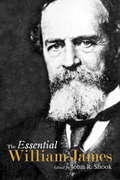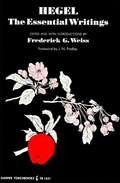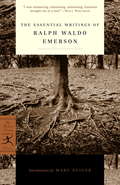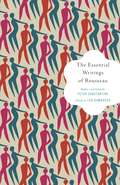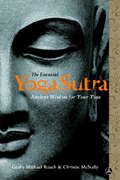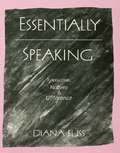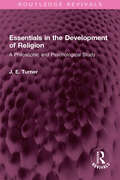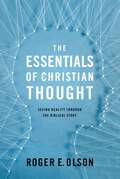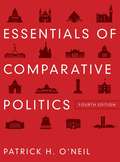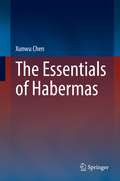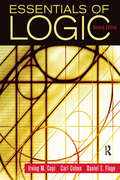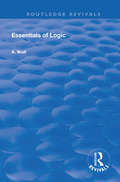- Table View
- List View
The Essential Peirce, Volume 1: Selected Philosophical Writings (The Essential Peirce)
by Nathan Houser and Christian Kloesel" . . . a first-rate edition, which supersedes all other portable Peirces. . . . all the Peirce most people will ever need." —Louis Menand, The New York Review of Books"The Monist essays are included in the first volume of the compact and welcome Essential Peirce; they are by Peirce's standards quite accessible and splendid in their cosmic scope and assertiveness." —London Review of BooksA convenient two-volume reader's edition makes accessible to students and scholars the most important philosophical papers of the brilliant American thinker Charles Sanders Peirce. This first volume presents twenty-five key texts from the first quarter century of his writing, with a clear introduction and informative headnotes. Volume 2 will highlight the development of Peirce's system of signs and his mature pragmatism.
The Essential Peirce, Volume 2: Selected Philosophical Writings (The Essential Peirce)
by Peirce Edition ProjectPraise for Volume 1:" . . . a first-rate edition, which supersedes all other portable Peirces. . . . all the Peirce most people will ever need." —Louis Menand, The New York Review of BooksVolume 2 of this convenient two-volume chronological reader's edition provides the first comprehensive anthology of the brilliant American thinker Charles Sanders Peirce's mature philosophy. A central focus of Volume 2 is Peirce's evolving theory of signs and its appplication to his pragmatism.
The Essential Plato: Apology, Symposium, and The Republic
by PlatoThree Socratic dialogues by the ancient Greek philosopher who established the foundations of Western thought. Apology: In this classic text, Plato recounts the trial of his mentor Socrates, who stands accused of rejecting the gods and corrupting the youth of Athens. As recounted by Plato, Socrates defends himself with a profound examination of integrity, citizenship, the nature of truth, and the role of a philosopher. Symposium: Here Plato depicts a group of Athenian intellectuals discussing the nature of desire. One after another, Agathon, Aristodemus, Eryximachus, Pausanias, and Aristophanes share their perspectives on gender, love, sexuality, and human instincts. The dialogue culminates in the radical views of Socrates, who advocates transcendence through spiritual worship. The Republic: Plato&’s magnum opus is a wide-ranging and deeply influential meditation on society as a whole. Plato explores the concept of justice, the connection between politics and psychology, the difference between words and what they represent, and the roles of art and education, among many other topics.
Essential Political Philosophy: Flash
by Mel ThompsonThe books in this bite-sized new series contain no complicated techniques or tricky materials, making them ideal for the busy, the time-pressured or the merely curious. Essential Political Philosophy is a short, simple and to-the-point guide to political philosophy. In just 96 pages, the reader will discover all the key ideas, from altruism to utilitarianism. Ideal for the busy, the time-pressured or the merely curious, Essential Political Philosophy is a quick, no-effort way to break into this fascinating topic.
Essential Readings in Biosemiotics
by Donald FavareauSynthesizing the findings from a wide range of disciplines - from biology and anthropology to philosophy and linguistics - the emerging field of Biosemiotics explores the highly complex phenomenon of sign processing in living systems. Seeking to advance a naturalistic understanding of the evolution and development of sign-dependent life processes, contemporary biosemiotic theory offers important new conceptual tools for the scientific understanding of mind and meaning, for the development of artificial intelligence, and for the ongoing research into the rich diversity of non-verbal human, animal and biological communication processes. Donald Favareau's Essential Readings in Biosemiotics has been designed as a single-source overview of the major works informing this new interdiscipline, and provides scholarly historical and analytical commentary on each of the texts presented. The first of its kind, this book constitutes a valuable resource to both bioscientists and to semioticians interested in this emerging new discipline, and can function as a primary textbook for students in biosemiotics, as well. Moreover, because of its inherently interdisciplinary nature and its focus on the 'big questions' of cognition, meaning and evolutionary biology, this volume should be of interest to anyone working in the fields of cognitive science, theoretical biology, philosophy of mind, evolutionary psychology, communication studies or the history and philosophy of science.
The Essential Russell Kirk: Selected Essays
by Russell KirkAs the author of The Conservative Mind and other seminal books, Russell Kirk is usually thought of as one of the American conservative political movement&’s most important progenitors. But as this collection demonstrates, Kirk was perhaps at his best as an essayist. This volume also confirms that Kirk&’s was principally a literary and historical conservatism that refused to fit the irreducible complexity of human experience to the requirements of any ideological straitjacket. With The Essential Russell Kirk, literary critic George A. Panichas captures the breadth and depth of Kirk&’s intellectual project by gathering together forty-four of the most masterful of Kirk&’s essays, along with a unique chronology told in Kirk&’s own words and a substantial introduction that articulates the deep humanism that animated Kirk&’s philosophy. The result is a carefully assembled volume that gives us a fuller picture of an extraordinary man and writer, one whose labors had, and continue to have, remarkable repercussions on the American literary and political landscape.
The Essential Sangharakshita: A Half-Century of Writings from the Founder of the Friends of the Western Buddhist Order
by Emily Stout Urgyen SangharakshitaProfoundly knowledgeable and articulate, and equally at home with science, philosophy, myth, art, and poetry, Urgyen Sangharakshita uses every inner avenue to communicate the timeless Dharma to the Western mind. Engaging both the intellect and the heart countless times in a single chapter, the author draws remarkably apt examples from sources as diverse as Orwell, Aeschylus, and Jane Austen. This distilled volume is a primer to the breadth and depth of Buddhist thought and practice.
The Essential Schopenhauer: Key Selections from The World as Will and Representation and Other Writings (Harper Perennial Modern Thought Ser.)
by Arthur Schopenhauer“We should be grateful to Schopenhauer for managing to express the truth about life so beautifully.” —Alain De Botton, author of The Consolations of Philosophy“Schopenhauer’s philosophy has had a special attraction for those who wonder about life’s meaning, along with those engaged in music, literature, and the visual arts.” —Stanford Encyclopedia of Philosophy The Essential Schopenhauer delivers the first comprehensive English anthology of the seminal philosopher’s writings. Edited by Wolfgang Schirmacher, president of the International Schopenhauer Association, this indispensible collection affords readers a uniquely accessible gateway into the monolithic thinker’s prodigious body of work. Just as the Harper Perennial Basic Writings seriesrenders the work of Heidegger and Nietzsche accessible for English readers, The Essential Schopenhauer gives us unprecedented access to the complex ideas of this profound and influential thinker.
The Essential Spinoza: Ethics and Related Writings
by Baruch Spinoza Michael L. Morgan Samuel ShirleyDesigned to facilitate a thoughtful and informed reading of Spinoza's Ethics, this anthology provides the Ethics, related writings, and two valuable appendices: List of Propositions from the Ethics, which helps readers to trace the development of key themes; and Citations in Proofs, a list of all the propositions, corollaries, and scholia in the Ethics, together with all the definitions, axioms, propositions, corollaries, and scholia to which Spinoza refers in the proofs--thus, readers can locate, for a given item, each instance where Spinoza refers to it.
The Essential Teachings of Zen Master Hakuin: A Translation of the Sokko-roku Kaien-fusetsu
by Norman Waddell Hakuin EkakuA fiery and intensely dynamic Zen teacher and artist, Hakuin (1685-1768) is credited with almost single-handedly revitalizing Japanese Zen after three hundred years of decline. As a teacher, he placed special emphasis on koan practice, inventing many new koans himself, including the famous "What is the sound of one hand clapping?" As an artist, Hakuin used calligraphy and painting to create "visual Dharma"--teachings that powerfully express the nature of enlightenment. The text translated here offers an excellent introduction to the work of this extraordinary teacher. Hakuin sets forth his vision of authentic Zen teaching and practice, condemning his contemporaries, whom he held responsible for the decline of Zen, and exhorting his students to dedicate themselves to "breaking through the Zen barrier." Included are reproductions of several of Hakuin's finest calligraphies and paintings.
Essential Transcendentalists
by Geldard Richard G.An anthology of core writings by the New England Transcendentalists, providing a unique overview of these landmark figures as spiritual thinkers. Interest abounds in the work of the Transcendentalists, such as Emerson, Thoreau, and Bronson Alcott. Each year, tens of thousands of readers rediscover Transcendental thought in books and articles, and in visits to historic sites, such as Walden Pond. But few appreciate the truly mystical and contemplative qualities of the Transcendentalists, and the spiritual movements and figures they have since inspired. As Richard G. Geldard-one of today's leading scholars of Emerson-illustrates in The Essential Transcendentalists, Transcendentalism adds up to a school of practical spiritual philosophy that aims to guide the individual toward inner development, much like that of Stoicism in Western antiquity. This current of New England mysticism has influenced modern-day luminaries as diverse as essayist Annie Dillard and Ernest Holmes, founder of the worldwide Religious Science movement. Through revealing commentary, historical overview, and selections from classic works, The Essential Transcendentalists provides a distinctive and heretofore neglected examination of the spiritual breadth and depth of Yankee mysticism.
Essential Transcendentalists
by Richard G. GeldardInterest abounds in the work of the Transcendentalists, such as Emerson, Thoreau, and Bronson Alcott. Each year, tens of thousands of readers rediscover Transcendental thought in books and articles, and in visits to historic sites, such as Walden Pond. But few appreciate the truly mystical and contemplative qualities of the Transcendentalists, and the spiritual movements and figures they have since inspired. As Richard G. Geldard-one of today's leading scholars of Emerson-illustrates in The Essential Transcendentalists, Transcendentalism adds up to a school of practical spiritual philosophy that aims to guide the individual toward inner development, much like that of Stoicism in Western antiquity. This current of New England mysticism has influenced modern-day luminaries as diverse as essayist Annie Dillard and Ernest Holmes, founder of the worldwide Religious Science movement. Through revealing commentary, historical overview, and selections from classic works, The Essential Transcendentalists provides a distinctive and heretofore neglected examination of the spiritual breadth and depth of "Yankee mysticism."
The Essential William James
by John R. ShookWilliam James (1842-1910) was one of the most original and influential American thinkers of the late 19th and early 20th centuries. As a professor at Harvard University he published many works that had a wide-ranging impact on both psychology and philosophy. His Principles of Psychology was the most important English-language work on the mind since Locke's Essay Concerning Human Understanding. His Varieties of Religious Experience practically inaugurated the field of psychology of religion, and it also remains a major inspiration for philosophy of religion. Perhaps most importantly, James publicized the movement of pragmatism and supplied much of its powerful momentum. This book covers the primary topics for which James is still closely studied: the nature of experience; the functions of the mind; the criteria for knowledge; the definition of "truth"; the ethical life; and the religious life. His notable terms, still resonating in their respective fields, are all here, from the "stream of consciousness" and "pure experience" to the "will to believe," the "cash-value of truth," and the distinction between the religiously "healthy soul" and the "sick soul." This volume's eighteen selections receive the bulk of the attention and citation from scholars, provide excellent coverage of core topics, and have a broad appeal across many academic disciplines. This well-organized compilation of James's important writings offers an exciting and fascinating tour for both the casual reader and the dedicated student interested in philosophy, psychology, religious studies, American studies, or any related field.
Essential Writings
by Georg Wilhelm Friedrich Hegel Frederick G. WeissHegel's essential writings on all aspects of philosophy
The Essential Writings of Ralph Waldo Emerson
by Brooks Atkinson Ralph Waldo EmersonIntroduction by Mary Oliver Commentary by Henry James, Robert Frost, Matthew Arnold, Oliver Wendell Holmes, and Henry David Thoreau The definitive collection of Emerson's major speeches, essays, and poetry, The Essential Writings of Ralph Waldo Emerson chronicles the life's work of a true "American Scholar." As one of the architects of the transcendentalist movement, Emerson embraced a philosophy that championed the individual, emphasized independent thought, and prized "the splendid labyrinth of one's own perceptions." More than any writer of his time, he forged a style distinct from his European predecessors and embodied and defined what it meant to be an American. Matthew Arnold called Emerson's essays "the most important work done in prose." INCLUDES A MODERN LIBRARY READING GROUP GUIDEFrom the Trade Paperback edition.
The Essential Writings of Rousseau (Modern Library Classics)
by Leo Damrosch Jean-Jacques Rousseau Peter ConstantineNewly translated by Peter Constantine Edited and with an Introduction by Leo Damrosch The Essential Writings of Rousseau collects the best and most indispensable work of one of the world's most influential writers. A towering figure of Enlightenment thought, Jean-Jacques Rousseau was also one of that movement's most passionate and persuasive critics. His extraordinarily original observations on politics, education, and human nature were provocative in their day and remain resonant more than two hundred years after his death. Rousseau's 1762 treatise The Social Contract laid intellectual groundwork for both the American and French Revolutions, influencing such figures as Thomas Jefferson. An eloquent writer with profound insight into human psychology, Rousseau also penned one of the most compelling autobiographies ever written--the magisterial Confessions. The entirety of the first three books of that masterpiece along with the complete Social Contract are included in this indispensable volume. Paperback edition.
The Essential Yoga Sutra: Ancient Wisdom for Your Yoga
by Geshe Michael Roach Lama Christie McnallyThe Yoga Sutra of Patanjali is a classic Sanskrit treatise consisting of 195 "threads," or aphorisms, describing the process of liberation through yoga. Although little is known about Patanjali (most scholars estimate that he lived in India circa 200-300 b.c.), his writings have long been recognized as a vital contribution to the philosophy and practice of yoga. This new, expert translation of the original Sanskrit text of Patanjali's best-known work presents his seminal ideas and methods in accessible, plain-language English. Patanjali organized the sutra into four parts: Samadhi (absorption), Sadhana (practice), Vibhuti (supernatural powers), and Kaivalya (liberation). Each represents a step in breaking free of our limited definition of consciousness and training the mind to achieve oneness with the universe. Geshe Michael Roach, one of the most respected teachers of Tibetan Buddhism in America and a renowned scholar of Sanskrit, provides authoritative commentary on each of the sutras. His notes and clarification are straightforward and highly readable, untainted by obscure, academic terminology or New Age jargon. The first edition of the Yoga Sutra to present a Buddhist perspective, this paperback original will be welcomed by students and spiritual seekers alike.From the Trade Paperback edition.
Essentially Speaking: Feminism, Nature and Difference
by Diana FussIn this brief and powerful book, Diana Fuss takes on the debate of pure essence versus social construct, engaging with the work of Luce Irigaray and Monique Wittig, Henry Louis Gates, Jr. and Houston Baker, and with the politics of gay identity.
Essentials in the Development of Religion: A Philosophic and Psychological Study (Routledge Revivals)
by J. E. TurnerFirst published in 1934, Essentials in the Development of Religion was written with the conviction that the psychological and philosophical analysis of all phases of religious experience, even those which may be accounted the highest, is capable of yielding results of inestimable importance which could be attained in no other way. Dr. Turner discusses the historical development of the philosophy of religion and reveals topics that have been presupposed or embodied in regular human life. The book will be of interest to students of philosophy, religion and psychology.
Essentials of Chinese Literature and Art Criticism Volume I
by Xu Yuechun Wang NingThis book offers a detailed analysis of China’s original view of literature and art theory and critical practice from the ancient to the modern period, providing views on dancing, image making, the circulation of artifacts, critical theory, creative writing, art design, aesthetic, cyber arts, photography, etc. This book makes visible the traditional Chinese ideas, philosophy and practices on literature and art in the world and contributes to the diversity of current international literary and art studies. All 15 chapters are translations of selected high-quality original theoretical contributions on Chinese literary and art theory published in prestigious peer-reviewed Chinese journals, whose authors are established scholars in Chinese academia.
The Essentials of Christian Thought: Seeing Reality through the Biblical Story
by Roger E. OlsonChristians disagree on doctrine, politics, church government, certain moral questions—just about everything under the sun, it can seem. Yet a unity remains, centered around a core outlook on God and the world that is common to all believers. Or at least, such an outlook should unite Christians of all theological and church backgrounds. However, alternate visions of reality often infect and corrupt Christians’ thinking. In The Essentials of Christian Thought, eminent theologian and church historian Roger Olson outlines the basic perspective on the world that all Christians, regardless of the place and time in which they are born, have historically held. This underlying metaphysic accords with all orthodox theologies, whether Calvinist or Arminian, Roman Catholic, Eastern Orthodox, or Protestant, but it separates Christianity from other religious and secular perspectives. It is, quite simply, the essential requirement of a Christian view of the world. Bold and incisive, The Essentials of Christian Thought will prompt thoughtful readers and students to more consciously appropriate the core of their faith, guarding against ideas that subtly but necessarily invite compromise.
Essentials Of Comparative Politics (Fourth Edition)
by Patrick H. O'NeilEssentials of Comparative Politics introduces students to the concepts that political scientists use to study and compare political systems and the particulars of specific political systems. The Fourth Edition has been revised and updated to include the most current and relevant examples and scholarship. The text is available with a corresponding casebook of 13 country studies and a corresponding reader; the three components can be used individually or in any combination.
The Essentials of Habermas
by Xunwu ChenThis book offers a conceptual map of Habermas’ philosophy and a systematic introduction to his work. It does so by systematically examining six defining themes—modernity, discourse ethics, truth and justice, public law and constitutional democracy, cosmopolitanism, and toleration—of Habermas' philosophy as well as their inner logic. The text distinguishes itself in content and perspective by offering a very clear conceptual map and by providing a new interpretation of Habermas’ views in light of his overarching system. In terms of scope, the book touches upon Habermas’ broad range of works. As for method, the text illustrates key concepts in his philosophy making it a useful reference aid. It appeals to students and scholars in the field looking for a current introductory text or supplementary reading on Habermas.
Essentials of Logic
by Irving Copi Carl Cohen Daniel FlageRendered from the 11th Edition of Copi/Cohen, Introduction to Logic, the most respected introductory logic book on the market, this concise version presents a simplified yet rigorous introduction to the study of logic. It covers all major topics and approaches, using a three-part organization that outlines specific topics under logic and language, deduction, and induction. For individuals intrigued by the formal study of logic.
Essentials of Logic (Routledge Revivals)
by A. WolfOriginally published in 1926, this book is an exploration of the essentials of logic: the study of the general conditions of valid inference. The main aim of logic is not to teach people to reason correctly, but to explain what happens when they do reason correctly, and why some reasoning is not correct, and this book contains chapters examining judgment and terms; categorical propositions and their implications; and deduction and syllogism.
